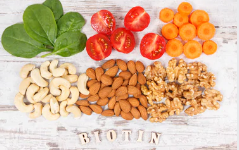By Sarah Beleski, a recent ASU Nutrition Student
If you’re a fan of reading health-related articles, you may have heard of the vitamin, biotin, and the health claims that are commonly associated with it. Biotin supplements have gained popularity for their claims to promote healthier-looking hair and nails. However, the popularity of the product is not what is most shocking to me. The most alarming aspect is the lack of data that supports the supplement’s claims.
So, the big question is… are biotin supplements worth your money? Do they actually work?
According to a journal article written by Deepa P. Patel and associates, a review of studies show that consuming biotin supplements have only proven to cause healthier hair and nails in individuals who had poor hair and skin prior to the vitamin supplementation. These individuals had a biotin deficiency, which for healthy individuals, is an extremely rare case.
Symptoms of a biotin deficiency include an assortment of issues, such as hair loss through alopecia, skin rashes, conjunctivitis, and even some neurological symptoms, such as depression and seizures. A biotin deficiency is the result of either congenital disorders or is acquired at some point in an individual’s life. Although very rare, one way that an individual could acquire a biotin deficiency is through excessive consumption of raw egg whites. It may sound like an odd connection, but there is a protein found in egg whites, known as avidin, that has the ability to hinder biotin absorption in the body. Cooked eggs have therefore never been a cause for biotin deficiency because once the egg whites are cooked, the protein avidin can be denatured and allow biotin to be used as an essential B vitamin.
Biotin can be found in various foods, which is why if an individual is eating a well-balanced diet, there most likely would not be a deficiency. It is also produced within a normal gut flora. The functions of biotin that lead people to believe that it will give them glossy hair and strong nails is its role in protein synthesis and keratin production. The vitamin does contribute to hair and nails, but studies show that the only real improvement is for people who have a biotin deficiency.
So, for the majority of the population who is not suffering from a biotin deficiency, the studies would suggest that a supplement is not needed. Not only are they not needed, they seem to not do much for healthy individuals. However, if you are still unsure about whether you think biotin could give you healthier-looking hair and nails, why not try a more holistic and economical approach?
Here are some basic examples of foods that are probably already in your diet and include a good amount of biotin! So, if you’re worried about not getting enough biotin in your life, check the list below and try to add a few of these to your meals this week.

Biotin-Rich Foods:
- Eggs
- Almonds
- Cauliflower
- Cheeses (most dairy products have some amount of biotin)
- Mushrooms
- Sweet Potato
- Spinach
So, back to my original question, are biotin supplements worth it? According to the studies that have been conducted, the only individuals who benefit from biotin supplements are those with acquired or congenital biotin deficiencies. There is no evidence that consuming biotin supplements will improve hair and nail growth for healthy individuals.
If you’re still looking to get healthier looking hair and nails, try to incorporate more whole foods that are biotin rich. Instead of taking a supplement with no proven benefits, why not make a little change to your diet that will ultimately have a positive effect on other areas of your health? Studies have shown that there is no such thing as “too much biotin”, so incorporating these foods into your diet, in a moderate fashion, will have no toxic effect on your system.
The beauty industry will always try to sell you products, no matter how truthful their product claims to be. It is our job, as consumers, to determine if the products are worth our money. As for biotin supplements boasting beauty claims, I suggest saving your money. If you are worried about a biotin deficiency, talk to your doctor before starting any new supplements.
References
Patel, D.P., Swink, S.M., & Castelo-Soccio, L. (2017). A Review of the Use of Biotin for Hair Loss. Skin appendage disorders, 3, 166-169.
Said, H.M. (2002). Biotin: the forgotten vitamin. The American Journal of Clinical Nutrition, 75, 179-180.
(1998) Dietary Reference Intakes for Thiamin, Riboflavin, Niacin, Vitamin B6, Folate, Vitamin B12, Pantothenic Acid, Biotin, and Choline. National Academies Press, 11.
Watson, K. (2017). Biotin-Rich Foods. healthline. Retrieved from https://www.healthline.com/health/biotin-rich-foods.

